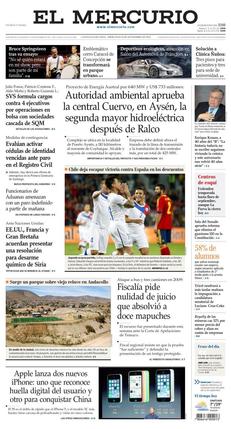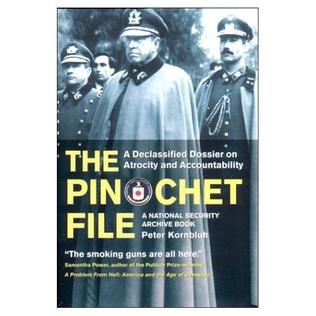
Salvador Guillermo Allende Gossens was a Chilean socialist politician who served as the 28th president of Chile from 1970 until his death in 1973. As a socialist committed to democracy, he has been described as the first Marxist to be elected president in a liberal democracy in Latin America.

Richard McGarrah Helms was an American government official and diplomat who served as Director of Central Intelligence (DCI) from 1966 to 1973. Helms began intelligence work with the Office of Strategic Services during World War II. Following the 1947 creation of the Central Intelligence Agency (CIA), he rose in its ranks during the presidencies of Truman, Eisenhower and Kennedy. Helms then was DCI under Presidents Johnson and Nixon, yielding to James R. Schlesinger in early 1973.

Operation Condor was a campaign of political repression by the right-wing dictatorships of the Southern Cone of South America, involving intelligence operations, coups, and assassinations of left-wing sympathizers in South America which formally existed from 1975 to 1983. They were backed by the United States, which collaborated and financed the covert operations. France, Venezuela, and Colombia are also alleged to have collaborated. Condor was formally created in November 1975, when Chilean dictator Augusto Pinochet's spy chief, Manuel Contreras, invited 50 intelligence officers from Chile, Uruguay, Argentina, Paraguay, Bolivia, and Brazil to the Army War Academy in Santiago, Chile. The operation ended with the fall of the Argentine junta in 1983.
United States intervention in Chilean politics started during the War of Chilean Independence (1812–1826). The influence of United States in both the economic and the political arenas of Chile has since gradually increased over the last two centuries, and continues to be significant.

The 1973 Chilean coup d'état was a military overthrow of the democratic socialist president of Chile Salvador Allende and his Popular Unity coalition government. Allende, who has been described as the first Marxist to be democratically elected president in a Latin American liberal democracy, faced significant social unrest, political tension with the opposition-controlled National Congress of Chile. On 11 September 1973, a group of military officers, led by General Augusto Pinochet, seized power in a coup, ending civilian rule.

Presidential elections were held in Chile on 4 September 1970. Salvador Allende of the Popular Unity alliance won a narrow plurality in a race against independent Jorge Alessandri and Christian Democrat Radomiro Tomic, before having his victory confirmed by a contingent election after the Christian Democrats voted in favour of his candidacy.

Salvador Allende was the president of Chile from 1970 until his suicide in 1973, and head of the Popular Unity government; he was a Socialist and Marxist elected to the national presidency of a liberal democracy in Latin America. In August 1973 the Chilean Senate declared the Allende administration to be "unlawful," Allende's presidency was ended by a military coup before the end of his term. During Allende's three years, Chile gradually transitioned into a socialist state.

René Schneider Chereau was a Chilean military official who served as commander-in-chief of the Chilean Army at the time of the 1970 Chilean presidential election, when he was assassinated during a botched kidnapping attempt. He coined the doctrine of military-political mutual exclusivity that became known as the Schneider Doctrine.
Roberto Urbano Viaux Marambio was a Chilean Army General and the primary planner of two attempted coups d'état in Chile in 1969 and 1970. The first was against President Eduardo Frei Montalva, and the second sought to prevent Socialist Salvador Allende's election.

Peter Kornbluh is a senior analyst at the National Security Archive and the director of the Chile Documentation Project and the Cuba Documentation Project.

El Mercurio is a Chilean newspaper with editions in Valparaíso and Santiago. El Mercurio is owned by El Mercurio S.A.P., which operates a network of 19 regional dailies and 32 radio stations across the country.
Camilo Valenzuela was a Chilean General and chief of the garrison in Santiago de Chile. In 1970 he led a group that with intent to stop the newly elected Salvador Allende from being inaugurated as president, tried to kidnap constitutionalist Army Commander-in-Chief René Schneider.

The Government Junta of Chile was the military junta established to rule Chile during the military dictatorship that followed the overthrow of President Salvador Allende in the 1973 Chilean coup d'état. The Government Junta was the executive and legislative branch of government until 17 December 1974, when Augusto Pinochet was formally declared President of Chile in late 1974. After that date, it functioned strictly as a legislative body until the return to democracy in 1990.
Thomas Hercules Karamessines was the Deputy Director for Plans of the United States Central Intelligence Agency from July 31, 1967 until February 27, 1973. Karamessines was actively involved in the Agency's Project FUBELT to undermine the government of Chilean president Salvador Allende.

On 21 September 1976, Orlando Letelier, a leading opponent of Chilean dictator Augusto Pinochet, was assassinated by car bombing, in Washington, D.C. Letelier, who was living in exile in the United States, was killed along with his colleague Ronni Karpen Moffitt, who was in the car with her husband Michael. The assassination was carried out by agents of the Chilean secret police (DINA), and was one among many carried out as part of Operation Condor. Declassified U.S. intelligence documents confirm that Pinochet directly ordered the killing.
The UNROW Human Rights Impact Litigation Clinic is a student litigation and advocacy project at American University's Washington College of Law.

Augusto José Ramón Pinochet Ugarte was a Chilean military officer who was the dictator of Chile from 1973 to 1990. From 1973 to 1981, he was the leader of the military junta, which in 1974 declared him President of the Republic and thus the dictator of Chile; in 1980, a referendum approved a new constitution confirming him in the office, after which he served as de jure president from 1981 to 1990. His time in office remains the longest of any Chilean ruler.
Frank Teruggi, Jr. (1949–1973) was an American student, journalist, and member of the Industrial Workers of the World, from Chicago, Illinois, who became one of the victims of General Augusto Pinochet's military shortly after the September 11, 1973 Pinochet coup d'état against Socialist President Salvador Allende.

The Pinochet File is a National Security Archive book written by Peter Kornbluh covering over approximately two decades of declassified documents, from the Central Intelligence Agency (CIA), Defense Intelligence Agency (DIA), White House, and United States Department of State, regarding American covert activities in Chile. It is based on more than 24,000 previously classified documents that were released as part of the Chilean Declassification Project during the Clinton administration, between June 1999 and June 2000.

Agustín Iván Edmundo Edwards Eastman was a Chilean newspaper publisher, and one of the richest people in Chile. He inherited his family's newspaper company El Mercurio SAP, which publishes Chile's leading national dailies El Mercurio and La Segunda among others, when his father died in 1956. He has been described as a media baron, and is known for his right-wing views. Throughout his time as publisher, he has used El Mercurio SAP's newspapers to influence public opinion in Chile, and he supported the 1973 coup d'état to oust socialist President Salvador Allende.















